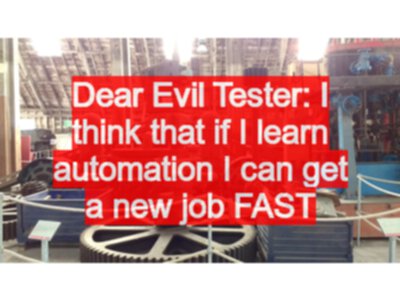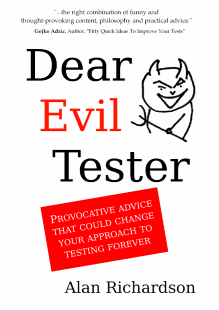TLDR; If you want a new job, then build a portfolio while you ’learn'
Following on from the ‘How do I learn ‘automation’?" question. We had to ask questions to see what they would do with this newly learned ability to automate. If it was to find a job, then how long did they want to wait? And did they have a specific job in mind?
If there was no job in mind, and they wanted it fast then that is not a good combination for a ‘how to’ answer to the question they asked.
If you have no job in mind
Chances are, I probably won’t recommend ’learn automation’ to you.
Depends on a few things:
- do you want a new job fast?
- are you prepared to go public with your learning?
Do you want a new job fast?
If you want to find a job fast then you are better off not trying to ’learn automation’. Instead concentrate on your existing skills.
The main reason being, that if you want to get a job fast you need to sell yourself either as you are, or with small incremental augmentation.
For augmentation then try to identify some of the objections that a new employer might have towards you.
- not technical enough
- doesn’t understand databases
- hasn’t tested mobile
- hasn’t tested the web
- etc.
Then find a way to make that a non-issue. “Fast learner” on the CV probably won’t do it.
“Not technical enough” and “doesn’t understand …” mainly arise from interviews where either you couldn’t answer a question or couldn’t ‘do’ something in an audition process e.g. couldn’t ‘use’ a tool effectively.
These are areas where some work before hand can help.
I outline a basic process in an old video I created for ‘how to learn selenium’ which we can generalise to most tools:
- Read the official documentation
- Download the tool and try to use it
- Search for books and read their previews
- Google for tutorials, blogs, videos (and gorge yourself quickly - watch vids on 1.5 speed, read fast, dip in and out)
- Search stack exchange for specific questions
- Search for ’error messages’ you see
- Do the work
Most tools or technologies have some sort of open source access point. Put the work in to gain ’talking’ familiarity, and the more work you put in, the better you’ll be able to discuss it in an interview situation and you might be able to survive an audition as well.
If you can test, but think your skills are a bit rusty or not technical enough then I would point you at past articles on this blog, or my recent Sigist talk “Push Your Functional Testing Further”. If you want something a bit more structured then my Technical Web Testing 101 online course.
Are you prepared to go public with your learning?
What differentiates your 2 page CV from someone else’s 2 page CV? The fonts? A photo?
Do you have an online portfolio?
- Do you have a blog?
- Do you have ‘stuff’ on github?
- Have you written any articles and linked to them on your website?
Spend some time building an online portfolio of work.
- You want to showcase your existing strengths, which may not come through in a CV.
- You want a central place you can point people to, which allows them to ‘see’ evidence of your testing skills.
You could use a linked in profile for that:
- with your recommendations link to published work etc.
But a web page will probably let you focus the reader a bit more.
- If you can code, release your code to github. Github doesn’t need to be just code, people add ’lists’ of useful resources there as well.
- Write articles or blog posts about your experiences - primarily describing what you have learned, or what you would do differently next time.
- If you are actively boosting your skills then blog about what you are learning. This will also be useful to you as a set of links and notes to help you in the future.
Your portfolio can:
- help you showcase your strengths
- force you to ‘create content’ and you’ll reflect on what you’ve done and learned and that will be good interview prep as well as building your portfolio
- force you to learn ’new stuff’ and demonstrate that you are a ‘Fast learner’ and have ‘good written communication’ as your CV states
Read more in the other ‘Extended Answers’:
- “I think that if I ’learn automation’ I can get a new job - FAST”
- “I think that if I ’learn automation’ I can get a new job doing ’this’”
- “I want to keep my testing skills up to date otherwise I might not get another job”
For funny and thought provoking “Dear Evil Tester”" answers, read the book.








